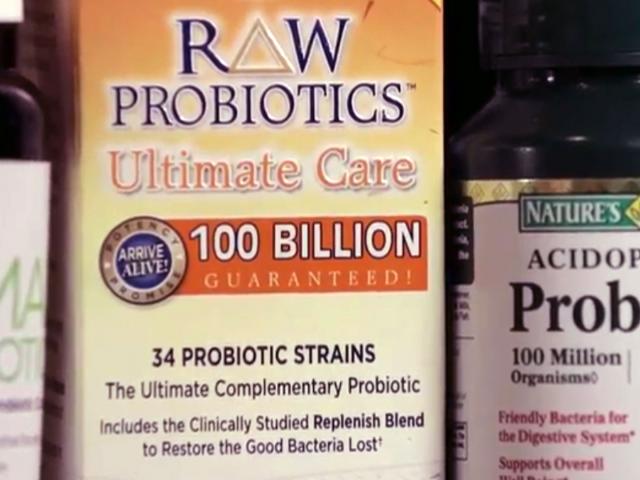Happy Gut, Happy Body: Boost Your Health with These Simple Keys
Hippocrates, the father of medicine, once said, "All disease begins in the gut." Now, 2,000 years later, that belief still rings true. Some of our latest medical breakthroughs focus on what's happening in our intestinal system.
Bacteria, also known as bugs or germs, we assume they're all bad, right? Not so fast.
Scientists recently discovered much, if not most, of the bacteria in our body is good for us. The key to good health depends on having enough of the right kind.
1. 'Anti-Gut' Antibiotics
We all have trillions of bacteria living in our intestines--hundreds of different species, each with different functions. Scientists call it our "gut flora."
Neurologist Dr. David Perlmutter, author of Brain Maker, is one of many physicians warning against disrupting this fragile ecosystem.
"We all carry good and bad bugs, if you will," he said. "And it's the imbalance that seems to be the biggest trigger for our illnesses."
Dr. Vincent Pedre, author of Happy Gut, agrees.
"The connection between the gut and the immune system is quite significant, because 80 percent of our immune system is located all along the boundary of the gut," he said.
Unfortunately, when it comes to good gut bacteria, many of us are sorely lacking.
"We're seeing an epidemic of disruption of the micro-biome of the gut bacteria worldwide," Pedre said. "And the reason for that is because of the widespread use and prescribing of antibiotics."
After all, antibiotics kill bacteria – bad and good alike.
Perlmutter says most people have no idea how severely antibiotics damage our gut flora.
"You've got to understand that taking an antibiotic will change the complexity of your gut bacteria and the diversity of the gut bacteria for the rest of your life," he said. "Just one course of antibiotics."
2. Processed Food Disruption
In addition to antibiotics, processed food can also disrupt the gut biome.
"There's way too much sugar in our diet and that sugar breeds bad organisms," Pedre said. "And when I say sugar I'm also talking about artificial sweeteners because it's been shown that artificial sweeteners cause a dysbiosis and promote the growth of not very favorable bacteria, bacteria that can cause inflammation and disease."
Perlmutter says processed foods contain heavy doses of the wrong kinds of fat, like heated oils such as soybean, corn and vegetable oils. He also advises against consuming hydrogenated oils, also known as trans fats, which are common in processed foods.
However, he points out not all fat is bad.
"We've got to welcome fat back to the table," he said. "But only the good fats, not the modified fats. So be very liberal with your use of extra virgin olive oil, coconut oil, grass-fed meat if you can find it, wild fish, nuts, and seeds."
Even babies delivered by Caesarian section can miss out on getting enough good bacteria.
"We gain our first bacteria at the moment of birth," Perlmutter explained. "When we are born and we pass through the birth canal, the baby is inoculated with bacteria that are transferred from mother to baby. And those are the seeds for the gut bacteria that will last a lifetime."

3. Probiotics, Prebiotics
So while our lifestyle choices really do a number on the gut bacteria that are so critical to our health, the good news is we can improve it with probiotics and prebiotics.
Probiotics are the good bacteria we need and often lack. You can find these living, microscopic organisms in supplements as well as in cultured and fermented foods like kimchee, sauerkraut, yogurt, kefir, and kombucha.

Prebiotics are the food for the probiotics – they keep probiotics living and growing as they should. Just like good soil, they create a nurturing environment in your gut so your bacteria can thrive.
You can get prebiotics in supplement form as well as in foods, like asparagus, onions, leeks, garlic and dandelion greens.

Perlmutter says many people are only aware of the benefits of probiotics, but he stresses prebiotics are equally important.
"When people start increasing their prebiotic fiber, the changes in their health are remarkable," he continued. "Weight loss, immediate improvement of mood... by adding prebiotic fiber to your diet. Who knew? This is revolutionary new information."
Nurture the Gut, Nurture the Whole Body
Not only can it help your mood -- Perlmutter says even serious brain disorders, like attention deficit hyperactivity disorder, autism, even Alzheimer's disease can improve by increasing good bacteria. That's because they help make neurotransmitters and vitamins while at the same time aid in reducing harmful inflammation.
"I lost my dad just last year to Alzheimer's disease," Perlmutter said. "So I really get it. And I want to stand up and be heard: that it's great that we try to develop a cure for this disease. But we know right now, as we have this discussion, that it is preventable. And when we eat a diet that nurtures the gut, it will nurture the brain."
And not just the brain.
Scientists are now identifying specific strains of good bacteria that treat all kinds of problems, from skin rashes to the flu.
That means a targeted probiotic could take the place of a prescribed drug. Pedre says that opens the door to a wide range of natural treatments.
"I think we're just on the tip of the iceberg of learning how to harness that potential and use it for therapeutic interventions," he said.
So if you want to boost your health, doctors say to improve your gut flora. That means avoiding processed foods, even antibacterial cleansers and antibiotics when advisable.
Then add good bacteria with probiotics and boost them with prebiotics, also available as supplements or in certain foods.




